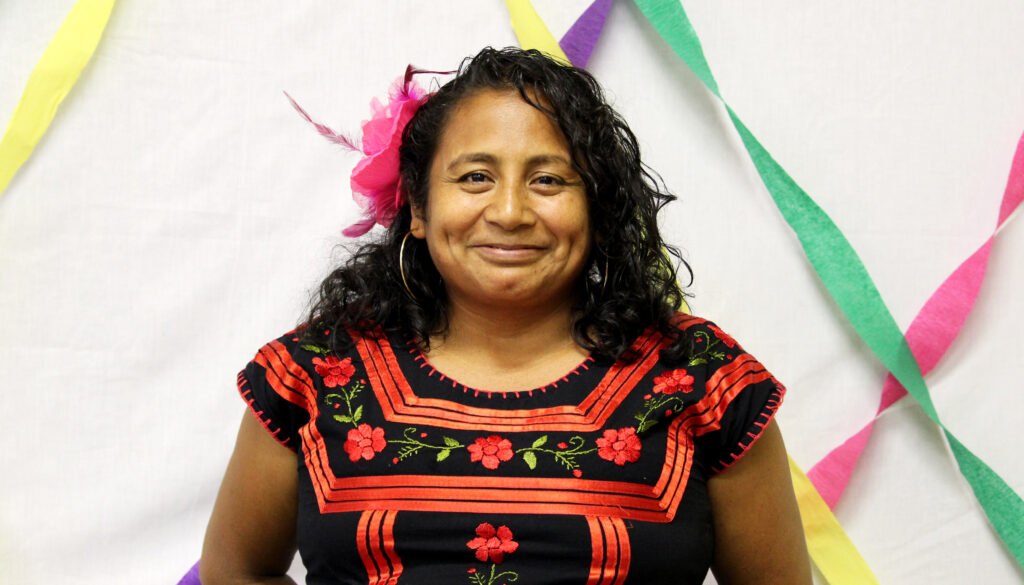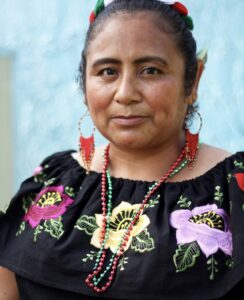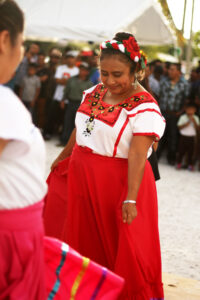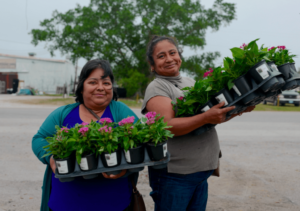
Antonia Rios in The New York Times: “The most beautiful thing is knowing all of the other workers, chatting with them, learning about their lives and their experiences. Many have left their families in order to put food on the table.”
Silvia Perez, CIW staff and friend of Antonia: “Antonia was a powerful woman. She was a strong woman. She always believed in the dignity and the justice for workers.”
Today, we mark a month since the incalculable loss of our dear friend, Antonia Rios Hernandez, whose bright light in our community was extinguished all too suddenly in a terrible accident at work.
Antonia was a pillar of the Immokalee community whose tireless efforts to realize justice for farmworkers while raising a family continually inspired us. A true human rights hero, Antonia’s life was cut short prematurely when an out-of-control driver jumped a curb and struck her while she was doing landscaping work in the Immokalee area. She leaves behind a husband, Alfredo Leon Cruz, two daughters, Daniela Leon Cruz and Vanessa Leon Cruz – both of whom grew up in the CIW community – and an entire community in mourning.
One of Antonia’s dreams was for her two beautiful daughters to have educational opportunities beyond what she herself had as a young woman. To that end, friends of Antonia and her family are maintaining a GoFundMe to support her family and help pay for the college tuition of her eldest daughter. If you are able to, please consider donating to her family by clicking here.
Antonia was, by every measure, an extraordinary human being. Today, we would like to take a moment to remember her life and the impact she has had as an irreplaceable leader in the human rights movement born in Immokalee, a place she has called home for decades. Antonia had been deeply involved in the work of the CIW since 2017, and in her years with us, she took part in our Campaign for Fair Food and quickly became indispensable as a community leader. Whenever there was an action to call for accountability from the biggest corporations at the top of the food supply chain, Antonia was there – leading chants, carrying signs, engaging community members, and embodying the virtues the CIW seeks to cultivate in the world.
For five days in 2018, Antonia went without food in the frigid cold with other CIW members and allies outside the Manhattan hedge fund offices of Nelson Peltz – the chairman of Wendy’s – to demand justice for the farmworkers facing sexual abuse in the fields.
Antonia (second speaker) responds to Wendy’s outrageous dismissal of the 2018 fast in New York.
Throughout the entire week-long fast, in spite of freezing rain and the even more frigid response from Wendy’s, Antonia remained resolute and cheerful. In our successive marches to Palm Beach in 2022 and 2023, Antonia was there at the front of our group. For our most recent 5-day march, when Antonia couldn’t participate because of her job, she sent her youngest high school-age daughter Vanessa in her stead. Antonia radiated with pride when she saw Vanessa, so often a quiet artistic presence, leading other youth in chants from the stage on the final day of the march. Antonia lives on in her daughters, who miss her love and guidance terribly but shine with the same, unique light that she brought to the world and carry her fire into the future.
Antonia’s commitment to her community went beyond participating with the CIW. She was also actively involved in Cultivate Abundance and Rural Neighborhoods. She led the charge to organize a petition drive to demand a long-overdue stoplight at one of the most dangerous intersections in town that many families had to cross to get to the local health clinic. County planners originally promised they would get to installing the light in six years, but thanks to the campaign organized by Antonia, the stop light appeared at that intersection in three. Antonia was the caretaker of a lush backyard garden including chickens, beehives, and fruit trees from which she would generously share cuttings, honey, and many a mango.
We will always remember Antonia’s contagious smile and indomitable spirit. She could be counted on to lend a hand whenever asked. She would always gladly share her story and sage advice. She was able to inspire others to participate in the CIW with her humble but consistent and committed presence.
Antonia and many other members of the CIW Women’s Group joined together to create a powerful call to action that was screened during Glennon Doyle and Abby Wombach’s 2017 Together Live Tour.
Many of the CIW women’s group’s current participants were inspired to come to their first women’s group meeting by Antonia, and the CIW women’s folkloric dance group was graced by her participation and her ever-present smile, laugh, and encouragement of others. She would share about the CIW and our struggle for justice wherever she went and especially with her co-workers.
Antonia will be greatly missed by everyone in Immokalee and beyond.
Finally, we want to share coverage of her remarkable advocacy, starting with a first-person profile from The New York Times during the COVID-19 pandemic.

Voices From the Front Lines of America’s Food Supply
Antonia Rios Hernandez – Former farmworker, Immokalee, Fla.
I worked on and off over the years. I worked for the last full season here, including during the pandemic. I started in August of 2019 in planting, then I worked all the way to the end of harvest, around May or June last year.
It’s a long day, it’s very challenging work. We would be picking, for example, cucumbers in the morning and tomatoes in the afternoon and they’re both very heavy work. My fingers would hurt by the end of the day. It hurts your back and makes your lungs ache to work that hard. I would sometimes come home and would just cry.
We were working long days, but they put a lot of protections in place. Lipman Family Farms were a part of the Fair Food program, and followed the procedures.
We would clean all of the tables with Clorox or bleach and make sure that everyone was washing their hands well. Thank God no one I know got sick. I wasn’t too afraid of the pandemic because of the precautions that the company was taking. They hired people specifically to clean the buses every day.
In the beginning of the pandemic, we knew that if we didn’t do this work, prices could go way up. We knew that when there aren’t people to pick the food, it could have a much bigger impact on everything else.
Our work is important, but the phrase “essential worker” is a title that we were given. We should have been not just thanked, but given real support. Especially in the beginning, when everything ran out in the stores. They had big gallons of sanitizer at work, and I brought a little bit home to keep our house clean.
If what we’re doing is so important, I thought we would be paid extra. All we got from the government was the one Covid check.
I found another job in landscaping, which is a bit lighter. But I believe that field work is incredibly important. It’s not just a tomato. Behind every vegetable is this long process.
The most beautiful thing is knowing all of the other workers, chatting with them, learning about their lives and their experiences. Many have left their families in order to put food on the table. I would try to encourage them and say, “Don’t worry, paisano.”
And here is a profile of Antonia from WUFT:

Rising from the Roots
Anything was better than what she had back home.
It’s been 20 years since Antonia Rios left Oaxaca for the United States. She believed her hometown in southern Mexico offered no future to raise a family as she wanted.
Antonia moved wherever she could find work and followed her brother to Immokalee, Florida. There, she worked six years as a farmworker in a town where 46% of inhabitants were born outside the U.S, according to the U.S. Census Bureau.
“You arrive here with your self-esteem below the ground,” Antonia said.
In Immokalee, she found home. Antonia and her husband Piwi Rios carved out a living for their beloved family of four, despite the long hours and low wages picking tomatoes. This year, Antonia became a citizen of the United States.
“Some of us come for opportunity,” Antonia said. “I am grateful to be living here in the U.S. I know that we can work hard and live simply.”
Now, Antonia rarely works in the fields but still stands in solidarity with the workers. She is an active member of the Coalition of Immokalee Workers, a union that fights for better rights and work standards in the farms of South Florida.
The Coalition created the Fair Food Program in 2011 and its terms require participating buyers to ensure safety protocols, worker education and to pay a one-cent premium for each pound of tomatoes picked.
The program has distributed over $30 million to workers through the penny-per-pound premium since 2011. The Fair Food Program also educates workers to report sexual harassment, a problem that has plagued the industry for years.
Rios said farmworkers wouldn’t speak out against workplace oppression for fear of losing their job or immigration status.
“It makes my heart happy to see us treated fairly,” Antonia said, who recalls earning $50 at the end of her 13-hour workdays.
Despite the uphill battles she faces as an immigrant in one of the state’s poorest cities, Antonia radiates positivity and charity. She regularly volunteers at her daughters’ school and gives baskets of fresh fruits and vegetables to friends from her overflowing garden.
“I don’t have time to think about negative things,” she said. “Every morning I watch the sun come up and listen to the birds and I think, ‘How can I not be happy?’”
Her world revolves around her daughters Daniela and Vanessa. She credits Daniela for giving her the strength to travel to El Paso, Texas, last year to receive her citizenship.
“I went alone to the border for the first time in 20 years,” Antonia said. “I went with the courage from my daughter. She told me to have no fear.”
Antonia instilled the principles of hard work and compassion in her daughters. The three have traveled to six states with the Coalition to protest.
Daniela, 17, is a senior at Immokalee High School will be the first member of her family to graduate high school and attend a university. As of November, she has been accepted to Florida SouthWestern State College and wants to pursue a career in criminal justice. Daniela is motivated by the racial and economic injustices she sees in the world today.
Her younger sister, Vanessa, may not yet have college on her mind but her strong performance in school allowed her to skip 5th grade this year.
“Our parents want us to work as hard as we can,” Daniela said. “I personally want to make them proud.”
Antonia survived the treacherous 1,500 mile journey to the U.S., Mexican border by foot, but she knows that others aren’t as lucky. It pains her to see families separated at the border.“The parents know why they are coming to the U.S., but the kids don’t,” she said. “Either all can come in, or none come at all. No need to separate families.”
Despite stricter immigration policies, over 977,000 migrants crossed the border without authorization in the 2019 fiscal year, the most since 2006 according to the U.S. Customs and Border Protection.Antonia said the migrants are not to blame, but rather the corruption in their home countries.
“They don’t work for the people,” she said of the migrants’ home governments. “They work for themselves. People are dying of hunger while Latin America is rich in production.”
Demonstrations across South and Central America, most recently in Chile, are critical of the status quo and call for more transparency and an end to corruption and violence.
In a few years, Antonia Rios will have spent more of her life in the United States than in Mexico. The roots she established in Immokalee grow deeper with each passing year. She says that her biggest blessing is the well-being of her family.
“We’re judged by what one migrant does, but we’re not everyone,” Rios said of her friends and family in Immokalee. “We are neighbors, mothers, daughters, employees and we contribute to the community. We are here to stay.”
When Antonia was killed, the shocking news spread quickly through Immokalee. NPR WGCU’s Eileen Kelley drove to Immokalee for her funeral mass and spoke with Antonia’s friends and loved ones about what she meant to them. Here is that story, which you can also find here.

Tragedy strikes the tight-knit Immokalee community with death of Coalition of Immokalee member
One of Antonia Rios’ first acts of resistance two decades ago was leaving behind a troubled childhood in Oaxaca, Mexico, and crossing into the United States.
Here she chased a new life and work, starting first in California, then in South Carolina, before settling in the close-knit agricultural town of Immokalee.
It was here that she labored in the tomato fields. She fell in love. She married. And raised two children, teaching them to stand up for their rights as women and to call out injustices that all-too-often face immigrants.
It was a here, on the afternoon of Sept. 18, that Rios died in a freak accident on land that had once been tomato fields but now was an upscale, planned-community.
Though still under investigation, the Florida Highway Patrol said Rios died after a motorist driving in the Ava Maria community jumped a curb and barreled through bushes before hitting Rios.
Now a landscaper, Rios was cutting grass on a riding lawnmower. Her death was quick and the scope felt immediately. She was 49.
“Oh my God, that was a great lady. Oh my God I cannot believe it,” cried neighbor Rose Hernandez, as she was just learning of the death. “It is a tragedy. … It hurts me because she was a worker, a good mama good wife, a good friend. Oh my God. She did not deserve to go like this.”
Perhaps she was making up for the years in Mexico, or perhaps it was because she was now raising two daughters, but for the last six or so years, Rios was becoming a face for the women and the immigrant worker’s movement in Collier County.
“Antonia was a powerful woman. She was a strong woman. Always believe in the dignity and the justice for workers,” said Silvia Perez, Rios’s good friend from the grass-roots, human rights group the Coalition of Immokalee Workers.
Rios took her daughters along to demonstrations in Florida and New York. She fasted. She frequently gave interviews to help people better understand the plight of immigrant workers in the United States.
“She left a seed planted,” Perez said. “Many, many seeds planted that are growing. And she was proud to see all those seeds growing and all the changes for workers and conditions changing and bettering.”
Consider Rio’s daughters Vanessa and Daniella some of the seeds left behind.
“My mom, you know, she would always bring us along with the protests, and we kind of grew up with the coalition,” said Daniella Rios.
The 22-year-old is studying agriculture at college in Georgia. Her mother was her sole provider of tuition. She’d like to graduate and come home to continue to expose injustices in the immigrant community.
“She was just so she’s so intelligent. She just knew everything. She was just, she was badass,” the older Rios daughter said. “Honestly, she was she really was. She didn’t take any anything from anybody. She would stand up for herself.”
Rios’s youngest daughter Vanessa Rios, is already a bit of an activist.
“Her activism, like really inspired me,” she said.
I first met 16-year-old Vanessa in March. She was among several hundred workers and human rights advocates who took part in a 50-mile march. The demonstration began in the agricultural town of Pahokee, where workers had been held behind barbed wire at night and at gunpoint in the fields by day.
“She was such an important part of this community. Everyone loved her. They cherished her. She was she was more than just my mom. She was my best friend. She was someone they would tell everything to she wasn’t. She will encourage me to be to be who I was,” Vanessa said.
Rest In Peace Antonia. Your dedication to this community and your joy for life will not be forgotten.



